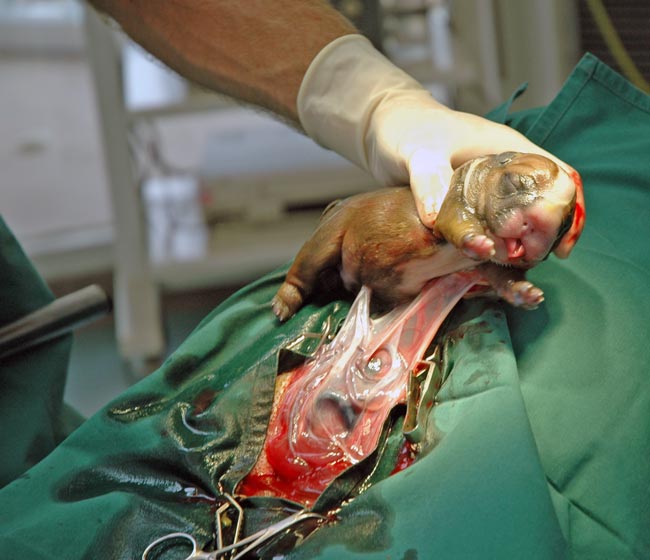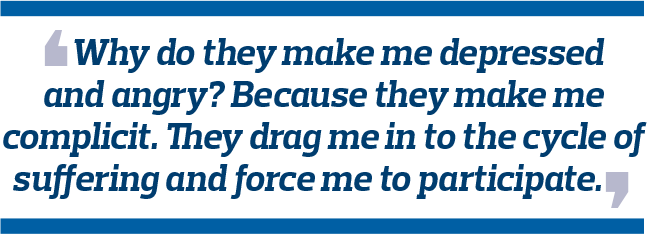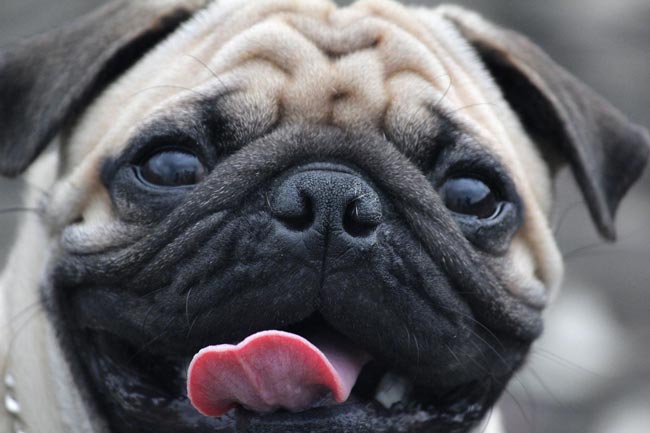25 Nov 2017
It seems an operation tailor-made for job satisfaction, but for Nick Marsh it has led to a contempt for “torture breeding” that has grown since his first job in general practice...

IMAGE: JacLou / Pixabay.
They should be joyful operations – from a distressed, painful dog in a potentially life-threatening situation, to a fixed one, in less than an hour, with none of that unsatisfying mucking about with blood gasses or puzzling over blood results.
The surgery itself is relatively simple and rather fun. To top it off, you (ideally) end up with an armful of squirming, squealing puppies at the end of it.
So, why does my heart sink when a caesarean comes in? Why, when I’m stitching up, do I have to grit my teeth when I hear the cooing and excitement of the work experience and support staff as they cuddle cute balls of fur taking their first breaths in the world?
The same reason many of you do, I suspect – and the breathing has a lot to do with it.

I have, over the years, become something of a fundamentalist about breeding. I wasn’t always this way; when I entered vet school, I knew I loved dogs, and had a vague idea about different breeds, but there my knowledge (and much of my interest in the subject) ended. I was interested in the medicine, not the breeds.
Even as my studies progressed and I began to read the lists of diseases various breeds were predisposed to, I learned them because I felt they would be valuable things to know, rather than a taking them as a sign a problem existed.
It was only after starting in general practice that it slowly occurred to me I was spending much of my working day dealing with problems (such as skin disease, ear disease, heart disease, hip and elbow disease, eye problems, and gastrointestinal problems) inherited from my patient’s parents and grandparents (which were, occasionally, the same animals).
As I spent my days watching animals suffer because of their genetics, rather than their environment, I started to ask myself exactly what breeding was doing to man’s best friend.
I began to wonder how my other best friends would feel if I forced them to spend a lifetime short of breath, or with painful joints, or itchy to the point of bleeding, or significantly increased their risk of premature death from cancer or heart disease, because I wanted them to look a certain way.
Slowly, and reluctantly, my distaste for dog breeding grew.
It’s a difficult position as a veterinary surgeon, because as I expressed my feelings, which I did carefully, I was frequently misunderstood.
I’ve heard people say “Nick doesn’t like pugs”, or similar, and that frustrates me deeply. I love pugs as much as all other dogs, which is quite a lot, but I wouldn’t be unhappy if I never saw another one in my life. Not because I don’t like them, but because they suffer; every moment of their lives, they suffer, because some people inexplicably think turning a vitally important anatomical structure inside out is “cute”.
 I use the term fundamentalist because I increasingly believe the breeding of an animal that spends its existence struggling for every breath, purely for cosmetic reasons, is an act of animal cruelty.
I use the term fundamentalist because I increasingly believe the breeding of an animal that spends its existence struggling for every breath, purely for cosmetic reasons, is an act of animal cruelty.
I have little sympathy for “responsible” breeders, because all the genetic testing, vaccinations and health checks in the world won’t change the simple fact that if they stopped breeding for a shape that is inherently unhealthy, all the problems they are testing for would go away.
My feelings about “irresponsible” breeders, who use living beings as money machines to pump out litter after litter of suffering creatures to feed a public demand that I can’t understand, are sadly not publishable here, save to note that I secretly hope in some form of karmic punishment where they are forced to spend as many years struggling to breathe, or unable to walk, as they have caused by their actions.
I know some people rail against the term “torture breeding” that has been floating about social media recently – they feel it is alarmist and over the top. I’m afraid it sounds entirely appropriate from my perspective.
This brings me back, via a slightly circuitous route, to caesareans. Why do they make me depressed and angry? Because they make me complicit. They drag me in to the cycle of suffering and force me to participate.
I am faced with a suffering animal, yet I know if I do what I have to do, I am helping perpetuate the pain and misery these anatomical disasters cause.

Sometimes, when I sit with the mother after the operation – her endotracheal tube still in place because, if I remove it any earlier than sternal recumbency, she’s likely to choke on her own soft palate – and telephone her owner, whose first question is inevitably “how many bitches are there?”, I think about how much money I have just helped this person make – not uncommonly upwards of £15,000 for a single litter.
I also think about the words I spoke a long time ago in a marquee in Langford: “Above all, my constant endeavour will be to ensure the health and welfare of animals committed to my care.”
This isn’t why I joined the profession.
This isn’t the way a caesarean should make me feel.